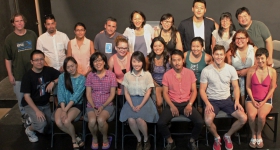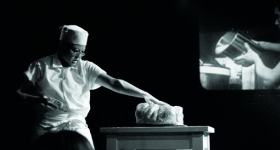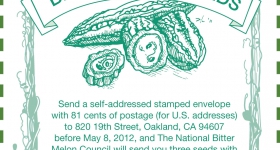Before Nobuko Miyamoto became a chopstick activist, she was probably best known for her role in what is commonly dubbed as the first Asian American band, Yellow Pearl.
The 1970s group was the first time that many ears were treated to a fusion of folk with Asian American political content, American jazz elements and English and Spanish lyrics. Miyamoto’s ethereal voice carried many songs in the seminal 1973 album A Grain of Sand: Music for the Struggle by Asians in America along with bandmates Chris Kando Iijima and Charlie Chin. Songs such as “Imperialism Is Another Word for Hunger” and “Warriors of the Rainbow” advocated for social justice not just for Asian Americans but for all people of color. The Spanish-titled “Somos Asiaticos” spoke to the group’s close ties with the New York City Latino community, and they also played many gigs for Black activist audiences (where Miyamoto struck up a friendship with fellow activist Yuri Kochiyama).
Miyamoto’s artistic career was borne from the challenges she faced breaking into mainstream performing arts. As a dancer and singer, Miyamoto landed roles in Broadway’s The King and I and Flower Drum Song, but she longed to, in her words, “break the color line,” and thus landed a non-Asian-specific role in West Side Story. Next she focused on singing, where she felt less inhibited by race to express herself artistically: “I could sing any kind of song I wanted to sing,” she says.
Through artistic and activist circles, she met Iijima. After the first time the two sang together, Miyamoto says, “We threw together a song the next day, for the Japanese American Citizens League. It was the first time I sang for an Asian American audience. For the first time, everybody realized we have our own song.”
The group stopped performing together after 1973, but the legacy of the groundbreaking band exists to this day. Tadashi Nakamura’s 2009 documentary on Iijima, A Song for Ourselves, has played at film festivals across the United States and won a Special Jury Award at the San Diego Asian Film Festival. A companion mixtape by DJ Phatrick splices Yellow Pearl classics with more recent works by young Asian American acts like Blue Scholars and Native Guns.
Miyamoto, however, is far from settling into a quiet retirement. She released a solo album in the 1980s, and another in 1997 titled To All Relations, which incorporated more of a world beat sound into her music, broadening from strictly folk. “I guess I put out an album every 10 years,” Miyamoto says half-jokingly, adding that another album is somewhere on the horizon.
Recently, she has begun using her music to address what she feels is the most pressing issue of the day: environmental preservation. Just as in the early 1970s, her voice is plaintive and insistent, carrying ideas that may be unpopular but must be said — and even sung.
Read about Miyamoto's B.Y.O. Chopstix campaign here. Read more about Miyamoto’s activist legacy and see original portraits here.
Find more information on the film A Song for Ourselves and download DJ Phatrick’s companion mixtape at asongforourselves.blogspot.com.









Comments